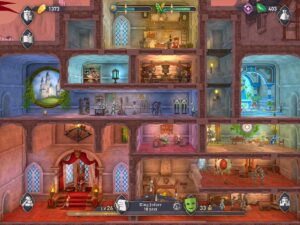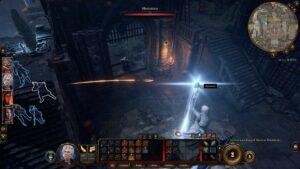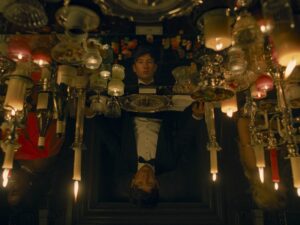As wish-fulfillment power fantasies go, finding out you’re secretly a reincarnated god seems like a pretty satisfying one. In Netflix’s imported 2021 Chinese feature New Gods: Nezha Reborn, that revelation comes with a lot of benefits: the ability to survive lethal wounds, the sudden emergence of kick-ass martial-arts powers, the respect and interest of the local power-players, and above all, the ability to rain down fire on any disrespectful enemies. For a street kid trying to find his place in an oppressive city run by a greedy crime gang, those all seem like game-changing benefits, an infinite upside in a world where few people have the strength to resist the dominant order.
But power in this kind of story inevitably comes with a price, and Nezha Reborn gets to the price quickly and definitively. The story, which revives and rewrites a handful of extremely popular characters from Chinese mythology, winds up focusing on the problems godlike power can’t fix as much as it focuses on the ones where white-hot cleansing fire is helpful. For all the eye-popping battles and fast-moving action, it’s an emotional story that takes the time to explore what its protagonist really wants out of life, and why god-tier power may be as much of a burden as a benefit.
Director Ji Zhao, who previously helmed the 2019 CGI feature White Snake, opens New Gods: Nezha Reborn with a quick summary of the cosmos: Three thousand years ago, the world was in chaos, with humanity and gods warring among themselves. The gods fought to establish a new hierarchy, which eventually brought the planet into a queasy balance. But certain gods are always looking to better their position. In Donghai City, a neon-drenched modern town with a strongly retro vibe, four clans rule over the people, and in particular, control the limited water supply. As Ao Bing, the third son of De Clan’s intimidating patriarch, says early on, keeping the town in need gives the poor something to focus on and keeps them in line: “Full bellies foster random thoughts.”
:no_upscale()/cdn.vox-cdn.com/uploads/chorus_asset/file/22449417/Nezha2.png)
Keeping the people’s bellies empty means creating artificial water shortages, which creates a niche for water smugglers like Li Yunxiang, a young man with a hot temper and a Robin Hood ethos toward to the suffering slum-dwellers. Early on, screenwriter Mu Chuan lays out Yunxiang’s tangled problems: a father who hates his choices and holds him in contempt; a fussy brother who worries about him and tries to bring him to heel; an employer who leads him into danger; a love interest whose name he doesn’t even know; a girl who’s a bit like a possessive but pushy sister. Yunxiang builds and races motorcycles in his spare time, which lets Nezha Reborn launch with a Ready Player One-style manic street competition that defies the laws of physics, and gives Yunxiang something small and specific to care about in a world full of much larger and louder concerns.
But then Yunxiang and Ao Bing face off over Yunxiang’s bike, in a set of sequences somewhere between Akira and the early inciting incident in John Wick. As the rich, spoiled scion of Donghai City’s primary ruler, Ao Bing naturally thinks anything his eyes fall on should be his. Yunxiang disagrees. In rapid order, what starts as a small but potentially fatal conflict over respect and a bike becomes a literal god-level battle, as Yunxiang discovers his secret heritage and power. Problem is, after his violent exaltation, he has no idea how to access or control his new abilities, and he has to seek help among the other secret powers of the world.
That process involves some extremely rich and engaging animation. Nezha Reborn’s CG-animated characters hover just a little too close to realistic to be entirely convincing; they tend to edge into the uncanny valley, rather than being more cartoonish in the way of the CG leads in movies like Lupin III: The First or How to Train Your Dragon. But the world around those characters is stylish and vividly designed, in everything from shining skyscrapers to mythological beasties to the glowing avatars that loom behind god-incarnate warriors when they draw on their heavenly powers. That opening race sequence is show-offy, compete with Yunxiang breaking the fourth wall to brag to the audience, but it sets the stage for a world that keeps visually escalating, falling deeper and deeper into fantasy with each new battle and each wild new setting.

New Gods: Nezha Reborn draws heavily on pan-Asian folklore and myth for its narrative spine. Nezha in particular has been a popular character for centuries, evolving from god to general to child to spirit in myths as disparate as the 16th-century novel Journey to the West, China’s 1979 animated hit Nezha Conquers the Dragon King, and the 2019 Chinese CGI feature Nez Ha, also currently streaming on Netflix. (That film takes a much more slapstick-driven approach to Nezha’s heavenly guardians in particular, and the visual approach starts off cartoony and child-centered compared to Nezha Reborn. But it eventually develops its own resonant emotional drama and staggering action sequences. The two films make an enjoyable double feature, just to see two radically different interpretations of the same classic characters.)
But in the New Gods incarnation, Nezha takes an almost literal back seat to Yunxiang, whose concerns are grounded and human. He wants to help his suffering people, and he wants to earn his father’s respect. And once his powers emerge, he has to face the fact that he’s dangerous to the people he cares about. The powers he’s channeling and the spirit within him are destructive and volatile rather than healing or nurturing. The story follows a track that’s familiar in Western animation and Western video games: Yunxiang inevitably finds bigger bosses to fight at periodic intervals, and levels up with every new conflict. But he’s never entirely free to think of his war as satisfying, pure, or righteous, the way so many power-tree-climbing Western heroes do. Even as a temperamental young man whose enemies are grasping, underhanded, and inhuman, he has to pause to consider the physical and emotional cost of his actions.

And when he inevitably fails in places, that failure hits hard. Nezha Reborn is a startlingly emotional story, one that finds time between explosive battles to let Yunxiang weep over his losses, and ponder his place in the universe. The filmmakers similarly find time to let his allies and enemies engage with each other, mulling over the past and the way their relationships have evolved over the eons. For a two-hour action movie, Nezha Reborn is startlingly dense and effective, and even surprisingly moving.
Like most fables, it eventually comes down on the predictable side of the cost-of-power debate. Ultimately, Yunxiang decides, having the ability to fight and change the world is better than being powerless and afraid. It’s a logical enough conclusion, even outside the boundaries of fantasy stories involving reincarnating gods and dragons. But New Gods: Nezha Reborn actually takes the time to give the question some serious thought, which makes it a much richer and more gratifying story than the usual magical-martial-arts throwdown.
New Gods: Nezha Reborn and Nez Ha are currently streaming on Netflix.
Source: https://www.polygon.com/22388029/new-gods-nezha-reborn-review-netflix
- access
- Action
- among
- animation
- around
- audience
- avatar
- Battle
- Bing
- Bit
- care
- CGI
- change
- child
- chinese
- City
- competition
- conflict
- Cosmos
- Creating
- Crime
- debate
- Dragon
- Drama
- Early
- Edge
- Effective
- Ethos
- Face
- Failure
- Feature
- Figure
- Film
- films
- finds
- Fire
- Fix
- Focus
- Free
- full
- Games
- Gang
- General
- How
- How To
- HTTPS
- idea
- interest
- IT
- keeping
- launch
- Laws
- Limited
- Line
- local
- loom
- love
- man
- mask
- motorcycles
- movie
- Movies
- Netflix
- opens
- order
- Other
- People
- Physics
- planet
- player
- poor
- Popular
- power
- price
- protagonist
- Race
- Relationships
- Retro
- Run
- set
- setting
- shortages
- small
- So
- son
- Stage
- Stories
- streaming
- street
- supply
- time
- track
- Video
- video games
- war
- Water
- WHO
- Wikipedia
- within
- world
- years






